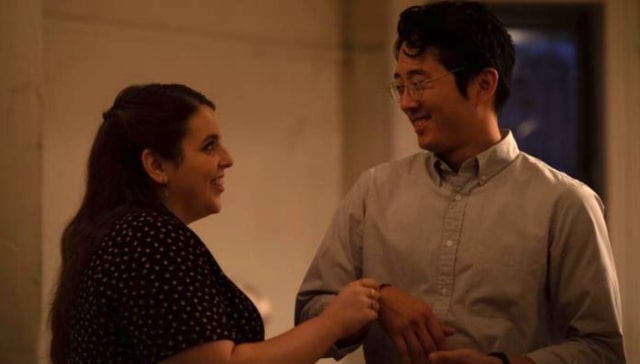In a scene from The Humans, Richard played by Steven Yeun talks about his years of depression as a 30-something man. His father-in-law Erik played by Richard Jenkins remarks rather rudely “Well we’ve never really had that kind of depression in our family”. To this abrupt denial his older daughter, the in-her-element Amie Schumer says “Well we just have a lot of stoic sadness”. The Humans is Stephen Karam’s adaptation of his own Broadway play an unlike most stage-to-screen adaptations the film doesn’t feel reckless in its use of newfound space and focus. In fact, even though it’s not the first film about the gathering of a dysfunctional family, it has a syntax that is eerie, almost a bridge between science fiction and horror that no other film in the genre can lay claim to. It’s Thanksgiving and in a pre-war Manhattan apartment a young couple (Richard and Beanie Feldstein as Brigid) invite their family over for a housewarming. Erik arrives with his wife, his ailing mother who also suffers from dementia and is joined on the floor by his older daughter Aimee by Schumer. The dilapidated state of the house, with its terrible lighting, tight corners and a weak cell phone signal echoes the dysfunctionality of a family that is at its most uncomfortable when together. Conversations have a really surreal quality in this film as they take place in corners, in groups of two and threes, as if trying to hide despite the paucity of space. It’s claustrophobic at times to even look at. Aimee is recovering from a break-up and is sauntering, deadpan into a career wall. Richard is on the cusp of 40 and in a relationship with Brigid who is struggling to put together money for a life around composing music. The rundown structure the young-ish couple has moved into is jarring to the eye, almost anti-architecture if you like. It makes for the perfect setting as secrets and grievances are aired in somewhat muted tones in a film that feels increasing surreal, and unfolds like a conversational horror – if that is even a thing. There is a sense of unease as the politeness with which commentaries are made makes way for personal frictions aired with the robotic tone of unconcerned outsiders. Erik’s displeasure at his children, Aimee’s fragility and the kamikaze yet stylish pursuits of the young hosts are all delicious ingredients in a film that is equally hilarious but just as displeasing as the house it is set in. Stage to screen adaptations are often considered vanity projects that struggle to get lift-off because of filmmaking’s lack of spontaneity but here the direction makes the friction of lives within a house that feels lifeless, ever so poignant and farcical. There is a scene between and Amiee and Erik where the former is being comforted by her father and after she rejects his warmth, she reluctantly calls her back. “Don’t stop speaking entirely”, Schumer says in what is probably a breakthrough role for a stand-up comedian who has always suggested ambition beyond her fiery, often unremarkable comedy. Steven Yeun, is perfect as a humble, under-confident man trying, not exactly to impress Brigid’s family but be accepted as one of the messy lot. The standout performance, however, comes from Jenkins, an over-the-hill father who has as many carcasses in his closet as many autopsies he conducts on people’s choices in public. In fact, the film’s visual style suggests a surveillance-like point of view, where we don’t exactly get to become part of the family, but we oversee and overhear what they say from an uncomfortable distance. It allows us a certain amount of insulation from this cold and dreary halfway house which also represents the economic pressure cooker this story of a thanksgiving dinner is set in. What works to aid the sense of unacknowledged tension is the geometry, the limited movements the characters can make. You could argue it’s stage-like but with the camera at clever, distant angles there is never a full-picture in sight. The duplex, its ungainly walls, leaking pipes, moist scaffolding, patchy paint-jobs, all affirm the dread that exists below the surface for people who pretend to exist over it. The Humans is especially relevant in the time of looming economic crises and the disastrous effect Covid has exacted upon lives touched by it. It also represents the asynchronous musicality of a family that really, though it meets in one moment, exists mostly beyond it. This may feel like a cataclysmic finale, but the film rarely plays out like a cathartic end and instead lingers after it has finished. Hell these guys, might not even meet each other if they did not need it. Dysfunctionality here does not play out like caricaturised hell, but a subversive, more restrained version of people simply trying to avoid running into each other’s lives in a world that offers them little space. Kind of like the house, they meet and have Thanksgiving dinner in. The Humans is streaming on Mubi India
The author writes on art and culture, cinema, books, and everything in between. Views expressed are personal. Read all the Latest News , Trending News , Cricket News , Bollywood News , India News and Entertainment News here. Follow us on Facebook, Twitter and Instagram


)
)
)
)
)
)
)
)
)



